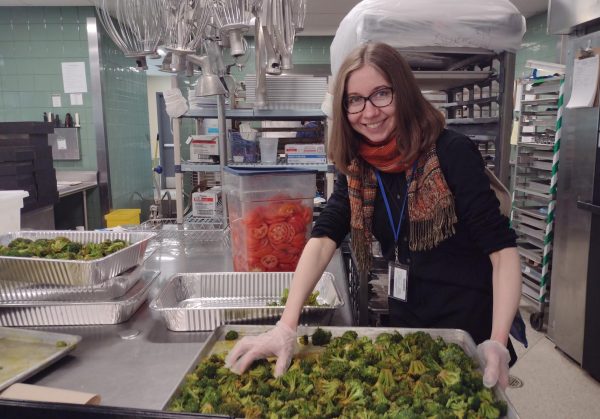In the 2024 fall semester, students and staff working in collaboration with Macalester’s Sustainability Office collected and redistributed 2,700 pounds of uneaten food from campus events and Cafe Mac. In the spring and summer of 2024, they recovered 3,800 pounds of food. As Macalester’s recent receiving of the 2025 Food Waste Reduction award from Campus Race to Zero Waste suggests, this isn’t because the college is producing more food waste, but that it’s getting better at recovering uneaten food.
The case study detailing Macalester’s food recovery efforts since 2023 was submitted by Basilia Cruz Blue ’27 and Sustainability Director Megan Butler and has been highlighted in multiple Mac Daily issues since Sept. 18. For Butler, food recovery confronts the climate crisis and rising food insecurity simultaneously.
“It feels wrong to have to be able to say we have a lot of food waste and then also be able to say we have a lot of food insecurity,” Butler said.“[This] is where the food recovery comes in.”
To help combat food insecurity, about three to seven volunteers collect, label and pack edible foods — ingredients or meals that are fit for human consumption, but haven’t yet been put out to serve — before driving them to Loaves and Fishes in Minneapolis.
Sustainability office student worker Nurain Jiwani ’26, who helped restart the food recovery program in his first year, hasn’t seen many procedural changes in recovery efforts, but noted that establishing lines of communication with Cafe Mac partners throughout the years has made a difference.
“The amount of food that we get has increased because they expect us to come throughout the week,” Jiwani said. “If there’s overproduction of a certain food that can’t be served or that there’s just too much of, they’ll set it aside for us. I think our partners in the cafeteria … have been really amazing about being on top of that.”
Food scraps unfit for human consumption don’t always go to waste either. These are distributed to Barthold Farms, which feeds the scraps to pigs.
This work doesn’t just feed people and pigs, but also moves towards Macalester’s sustainability goals and mitigates the effects of the climate crisis. Butler points to the non-profit climate organization Project Drawdown, which cites that 22–33 percent of all greenhouse gas emissions come from food, agriculture, and land use sectors.
“So much fossil fuels and carbon is going into producing food and storing food and transporting food that never is never eaten, and so if we can reduce that, we have a huge climate impact as well,” Butler said.
While previous recovery efforts have focused mainly on recovering food from Cafe Mac, the sustainability office started working to implement additional semesterly cleanouts in 2024. This involved going through Cafe Mac’s kitchens and sorting out safe-to-eat foods that could be donated to Loaves and Fishes instead of being sent to pigs. These cleanouts led to the inception of recovering food from large school-sponsored events.
“Sometimes, the challenge is finding where that food is,” Jiwani explained.

During May, a larger group of sustainability office staff and volunteers recovered 566 pounds of food from Commencement.
“I would love to bring volunteers for those big events, because I think it kind of opens people’s eyes to food production and food waste on college campuses,” Butler said.
But recoveries for larger events present different logistical challenges, namely, determining what food can be donated to Loaves and Fishes. Because food that has already been set out to serve cannot be repackaged and distributed to Loaves and Fishes, recoverers have to pivot to different strategies in order to distribute the food to humans. After the recent Meet Mac Days for prospective students this October, sustainability office workers and volunteers collected catered lunches and distributed them across offices on campus.
MacShare co-leader and Sustainability student worker Isabella Hackerman ’26 sees this as an opportunity to combat food insecurity on campus; according to the Laurie Hamre Center for Health and Wellness’ 2024 National College Health Survey, around 30 percent of Macalester’s student body is considered food insecure.
“There will always be excess food on this campus,” Hackerman said. “That’s just a fact of being a college and being an institution, but if we’re able to bring that food to people who need it, who are hungry, who are part of that 30 percent of students, which is shockingly high, and I think that’s where food justice fits in.”
For instances where this volunteer distribution isn’t able to happen, like at smaller, catered events, Hackerman and others are developing an ‘Extra Eats’ app, which will enable users to post the location of leftover food from events.
Sustainability’s work around food recovery isn’t just limited to food served at college events. MacShare collaborates with the Open Pantry to offer vouchers for its weekly Friday sales, which occur from 3:30 – 5 p.m. in the Janet Wallace Fine Arts Commons. These vouchers enable MacShare to give out produce for free for around half of MacShare’s buyers, according to Hackerman.
For community members looking to find ways to preserve or prepare foods, food processors and dehydrators are available upon request at the Sustainability Office, and Sustainability is planning occasions, such as the Salsa Making and Food Preservation event at the Sustainability Office on Wednesday, Oct. 29, from 11 a.m. – 1 p.m. to educate about sustainable recipes.
Looking forward, many involved in food recovery efforts hope to see more volunteer presence from students, staff and faculty, as well as institutional support, in order to continue the trend of increasing food recovered from Cafe Mac and campus events.
“I would love to get food recovery and food access more institutionally acknowledged and also funded,” Hackerman said. “I think a lot of food access programming is done by students, and you know, if suddenly, there’s not people on campus who there’s not students on campus who care about food access, a lot of the food access programming goes away.”
Those interested in helping with weekly Cafe Mac food recoveries at 8 p.m. on Sundays should contact [email protected] for more information.











